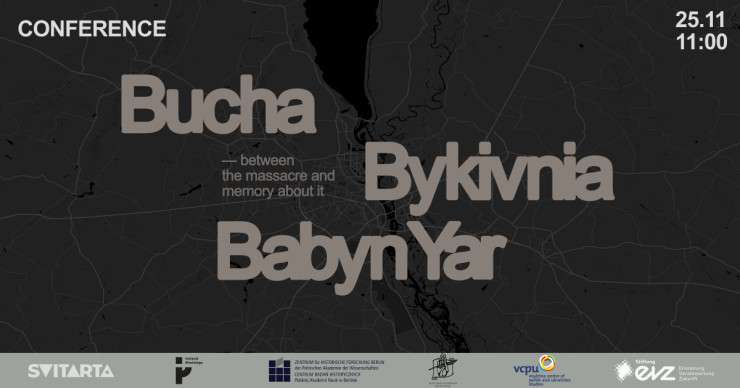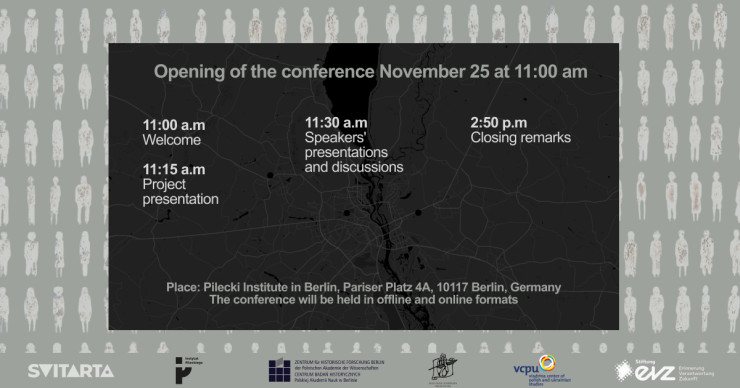Bykivnia, Babyn Yar, Bucha - Instytut Pileckiego
25.11.2024 (Mon) 11:00
Bykivnia, Babyn Yar, Bucha
Between The Massacre and Memory. An international Conference

International Conference: Bykivnia, Babyn Yar, Bucha - Between The Massacre and Memory
Find the full agenda further down below or Download it here
25.11, 11.00 | Pariser Platz 4A, 10117 Berlin | Registration: https://forms.gle/ikkXeu73gyU4g6q89
Zoom: https://forms.gle/WQMjUcpiW8iCcHUZ7
The conference will contribute to the understanding of the tragedies of the last
century and the inclusion of memories about present tragedies into the general memory paradigm of Ukrainian and European society. The conference can influence the memory culture in different European countries due to analytical approaches and well-thought-out presentations of academic papers. The conference will contribute to the development of clear and appropriate terminology to describe the chrarakter current Russian-Ukrainian war.

The aim of the conference is to analyze the causes and consequences of memorial discourses about past and present tragedies, as well as the commemorative practices that have emerged from them.
Main topics of the conference:
- Perceptions of the "triangle of evil" in the different European countries: politicians, academics, media, and the publications
- What different intellectuals, political and cultural groups in the European community understand by the terms communism, Nazism and rashism
- Discussion on the concept of rashism: sources and conceptualization
- Can we compare communism, Nazism and rashism?
The conference will be held in offline and online formats.
Place: Pilecki Institute in Berlin, Pariser Platz 4A, 10117 Berlin, Germany
Date and time: 25 November, starting at 11:00 a.m.
Zoom: https://forms.gle/WQMjUcpiW8iCcHUZ7
Organizers: NGO Svitarta, Center for Historical Research Berlin Polish Academy of Sciences, Centre of Polish and Ukrainian Studies at the Viadrina University, Pilecki Institute in Berlin, Lithuanian Institute of History. Supported by the EVZ Foundation.
Languages of the event: English and Ukrainian (simultaneous translation)
The conference is an important intellectual component of the holistic presentation of the project "Bykivnia, Babyn Yar, Bucha - Between the Massacre and the Memory of It".
About the Project: The idea of the project is to discuss the collective memory of сommunism, Nazism and Russia‘s contemporary crimes committed during the ongoing war of the Russian Federation against Ukraine through focusing on the three places of the mass executions of the civilian population around Kyiv:
- Bykivnia – victims of communism who were executed in the years 1937-1941.
- Babyn Yar – Victims of Nazism, killed in the years 1941-1943.
- Bucha – Victims of rashism, killed in the short period from 03.03 to 31.03.2022.
The project draws public attention to the traumatic legacy of the occupation of
Ukraine by the totalitarian communist and Nazism regimes and their impact on
collective memory. It also helps to find tools to understand and explain the reasons for the crimes of the current authoritarian regime in Russia.
The project offers the opportunity to look at communism, National Socialism and the current authoritarian regime in Russia from a historical retrospective, to compare their ideologies, objectives and terror methods and at the same time to try to develop mechanisms to counteract and prevent similar crimes in the future.
We invite you to an open dialogue not only about our past, but also about the
present and the future that we want to create. The project is implemented by Svitarta with the support of the EVZ Foundation.
Project partners:
- Ukrainian Institute of National Memory
- Zentrum für Historische Forschung Berlin der Polnischen Akademie der Wissenschaften
- Lietuvos istorijos institutas
- Sectoral State Archive of the Security Service of Ukraine
- The National Historical and Memorial Reserve Bykivnia Graves
- Babyn Yar is a National Historical and Memorial Reserve
- Archive department of Bucha City Council
Project website: https://bbb.in.ua/en/
Main topics of the conference:
- Perceptions of the "triangle of evil" in the different European countries: politicians, academics, media, and the publi;.
- What different intellectuals, political and cultural groups in the European community understand by the terms Communism, Nazism and Rashism;
- Should we compare Communism, Nazism and Rashism?;
- The essence of Rashism: sources, conceptualization, promotors.
10.30-11.00 - REGISTRATION
11.00-11.15 - WELCOME
Hanna Radziejowska, director of Pilecki Institute in Berlin
Andrii Portnov, professor of Entangled History of Ukraine, and Co-director of the Viadrina Centre of Polish and Ukrainian Studies at the European University Viadrina, Director of PRISMA UKRAЇNA Research Network Eastern Europe
Igor Kąkolewski, professor, Director of the Center for Historical Research Berlin Polish Academy of Sciences. Co-coordinator for the preparation and distribution of German-language materials, organizer of the conference in Berlin
MODERATOR
Andrii Portnov
11.15-11.30 - PROJECT PRESENTATION
Svitlana Liakhovets, art historian, coordinator of Central and Eastern Europe projects at the Institute of Lithuanian History, expert at the Ukrainian Cultural Foundation, Head of NGO Svitarta. Author of the idea and project manager of the Bykivnia, Babyn Yar, Bucha project
PRESENTATIONS
11.30-11.50 - The Phenomenon of Communism in Ukraine as an Object of Scholarly and Socio-Political Interest
Yuri Shapoval, professor, main research fellow at the Department of Theory and History of Political Science, Kuras Institute of Political and Ethnic Studies of the National Academy of Sciences of Ukraine. Field of research interest: political history and the history of political thought in Ukraine in the 19th-21st centuries; the politics of memory and the process of decommunization in contemporary Ukraine; history of the Communist totalitarian system in Ukraine; Holodomor in Ukraine; Polish-Ukrainian relations in the 20th century.
11.50-12.10 - Rashism: Challenges of Public Interpretation, Scholarly Conceptualisation, and Memorialisation
Larysa Yakubova, professor, Head of the Department of History of Ukraine 1920-1930, Institute of History of Ukraine. Field of research: history of ethnic minorities of Ukraine, national question, national policy, history of Eastern Ukraine and Donbas; history of Russian and Soviet totalitarian regime; Russo-Ukrainian War 2014 – 2024; Rashism and the ‘Russkiy mir’.
12.10-12.30 - The Unpunished Crimes of Communist Regime and Their Perception in Europe
Roman Podkur, PhD, senior research fellow at the Department of history of Soviet state terror, Institute of History of Ukraine. Field of researcht: history of the Communist totalitarian system in Ukraine; history of the communist secret services; political history of the 20th century.
12.30-13.00 - DISCUSSION
13.00-14.00 - LUNCH BREAK
14.00-14.20 - Teaching Holocaust History in Ukraine during russian aggression and war: challenges and results
Anatolii Podolskyi, PhD, leading research fellow at the Department of Ethnopolitical Studies, Kuras Institute of Political and Ethnic Studies of the National Academy of Sciences of Ukraine; Head of the Ukrainian Center for Holocaust Studies. Field of research: history of Jews in Ukraine in the 20th century, history of the Holocaust; Ukrainian-Jewish relations in historical perspective; comparative studies of the history of genocide of the 20th century.
14.20-14.50 - Memory in Constant Flux: Initiatives and Commemoration Practices on the Victims of Communist and Nazi Regimes in Contemporary Ukraine.
Nadiia Honcharenko, senior research fellow, Institute for Cultural Research of the National Academy of Arts; research fellow Non-Residential Scholarship at Indiana University (USA). Field of research: cultural studies, historical education, memory policy.
14.50-15.20 - CLOSING REMARKS AND DISCUSSION
David Rieff, an American essayist, journalist, and policy analyst, who work has largely focused written on war, humanitarian action, the global food system, and the politics and ethics of memory. He is fellow at the New York Institute for the Humanities at New York University, a member if the US Council on Foreign Relations, and an honorary professor at National University of Kyiv-Mohyla Academy.